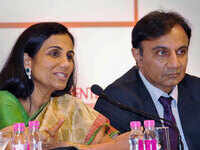RBI shouldn’t compromise on autonomy: Former CEA
TNN | Dec 13, 2018, 10:23 IST Arvind Subramanian (File photo)
Arvind Subramanian (File photo)MUMBAI: With a new RBI governor at the helm, former chief economic adviser Arvind Subramanian said the banking regulator should not compromise on its functional autonomy, but at the same time communication with the government is important for better decision-making. Outlining key priorities of the new governor, Subramanian said these will be to restore integrity of the financial system and maintain credibility of the institution.
Speaking at the fifth India Economic Conclave 2018 here on Wednesday, he said the RBI’s “functional autonomy and governance is sacred” which should not be “compromised”, but for an overall better functioning, communication (between the government and apex institution) has to be improved.
Acknowledging the steps taken by the RBI and former governor Urjit Patel, he said the central bank did a “commendable job” in dealing with NBFCs, restoring integrity of the financial system and prompt corrective action (PCA) — stressing that policies, not individuals, are key things one should focus on. Subramanian’s statements comes in the backdrop of a bitter rift between the RBI and the government, leading to Patel’s sudden exit on December 10. Weeks before Patel’s resignation, differences between the RBI and government on at least two fronts, PCA and NBFCs, were reported.
The RBI’s reserves became a bone of contention between the central bank and government, which according to him, must be used only for recapitalising banks, only if reforms are undertaken in public sector banks. This money must not be used for regular financing of the deficit, and should be done cooperatively, and not unilaterally, by the government or the RBI, and a committee is good way of ensuring that, he added.
The government had reportedly sought for an easing of PCA norms so that more banks are able to lend liberally, while it had pitched for strong liquidity support to the NBFC sector, which was rejected by the RBI. Earlier delivering the keynote address at this edition’s theme, ‘Shaping India’s $5 Trillion growth agenda’, Maharashtra CM Devendra Fadnavis highlighted key factors for achieving growth, and outlined plans for making Maharashtra the first Indian state to have a trillion-dollar economy by 2025.
“Maharashtra accounts for 51% of big infrastructure projects in the country, with 21% of all startups. We have also created strong governances with a war-room which has brought down the time of approvals by 75%. We have attracted over 8 lakh crore investments through the registered 18,000 projects, and have a fintech and direct purchase (from farmers) policy. Today, Maharashtra is the startup and FDI capital of the country. We aspire that by 2025, when India’s economy will be $5 trillion, Maharashtra will be the first Indian state to have a trillion- dollar economy,” said Fadnavis.
speaking at the same event, former RBI governor Raghuram Rajan also made a strong pitch for independence of financial regulators. “Twenty-five years of 7% growth is a good thing, and so we have come some distance. What helps us grow in a healthy way is strong institutions, whether it’s the pollution regulator, the efficiency regulator or the financial regulator. So these are the structures that we must strengthen.”
‘Abrupt Patel action risks RBI policies’
NEW DELHI: Fitch Ratings on Wednesday said abrupt resignation of Urjit Patel as RBI governor highlights risks to the central bank’s policy priorities, and increased government influence on the RBI could undermine the efforts to address bad loan problems.
It further said full implications of Patel’s exit will only become clearer once there is some indication of the RBI’s policy approach under his replacement, Shaktikanta Das, an experienced government bureaucrat. Fitch said, “The resignation of the RBI governor... follows a period of government pressure on the central bank to spur economic growth, and highlights risks to the RBI’s policy priorities. The RBI’s efforts to address bad loan problems have the potential to improve banking-sector health over the long term. (Agencies)
Speaking at the fifth India Economic Conclave 2018 here on Wednesday, he said the RBI’s “functional autonomy and governance is sacred” which should not be “compromised”, but for an overall better functioning, communication (between the government and apex institution) has to be improved.
Acknowledging the steps taken by the RBI and former governor Urjit Patel, he said the central bank did a “commendable job” in dealing with NBFCs, restoring integrity of the financial system and prompt corrective action (PCA) — stressing that policies, not individuals, are key things one should focus on. Subramanian’s statements comes in the backdrop of a bitter rift between the RBI and the government, leading to Patel’s sudden exit on December 10. Weeks before Patel’s resignation, differences between the RBI and government on at least two fronts, PCA and NBFCs, were reported.
The RBI’s reserves became a bone of contention between the central bank and government, which according to him, must be used only for recapitalising banks, only if reforms are undertaken in public sector banks. This money must not be used for regular financing of the deficit, and should be done cooperatively, and not unilaterally, by the government or the RBI, and a committee is good way of ensuring that, he added.
The government had reportedly sought for an easing of PCA norms so that more banks are able to lend liberally, while it had pitched for strong liquidity support to the NBFC sector, which was rejected by the RBI. Earlier delivering the keynote address at this edition’s theme, ‘Shaping India’s $5 Trillion growth agenda’, Maharashtra CM Devendra Fadnavis highlighted key factors for achieving growth, and outlined plans for making Maharashtra the first Indian state to have a trillion-dollar economy by 2025.
“Maharashtra accounts for 51% of big infrastructure projects in the country, with 21% of all startups. We have also created strong governances with a war-room which has brought down the time of approvals by 75%. We have attracted over 8 lakh crore investments through the registered 18,000 projects, and have a fintech and direct purchase (from farmers) policy. Today, Maharashtra is the startup and FDI capital of the country. We aspire that by 2025, when India’s economy will be $5 trillion, Maharashtra will be the first Indian state to have a trillion- dollar economy,” said Fadnavis.
speaking at the same event, former RBI governor Raghuram Rajan also made a strong pitch for independence of financial regulators. “Twenty-five years of 7% growth is a good thing, and so we have come some distance. What helps us grow in a healthy way is strong institutions, whether it’s the pollution regulator, the efficiency regulator or the financial regulator. So these are the structures that we must strengthen.”
‘Abrupt Patel action risks RBI policies’
NEW DELHI: Fitch Ratings on Wednesday said abrupt resignation of Urjit Patel as RBI governor highlights risks to the central bank’s policy priorities, and increased government influence on the RBI could undermine the efforts to address bad loan problems.
It further said full implications of Patel’s exit will only become clearer once there is some indication of the RBI’s policy approach under his replacement, Shaktikanta Das, an experienced government bureaucrat. Fitch said, “The resignation of the RBI governor... follows a period of government pressure on the central bank to spur economic growth, and highlights risks to the RBI’s policy priorities. The RBI’s efforts to address bad loan problems have the potential to improve banking-sector health over the long term. (Agencies)
Download The Times of India News App for Latest Business News.










































All Comments ()+^ Back to Top
Refrain from posting comments that are obscene, defamatory or inflammatory, and do not indulge in personal attacks, name calling or inciting hatred against any community. Help us delete comments that do not follow these guidelines by marking them offensive. Let's work together to keep the conversation civil.
HIDE